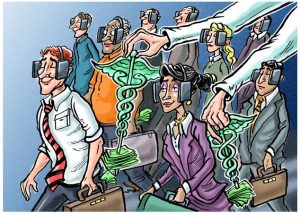
. “Americans act in ignorance of, and thus against, their own economic interest, making health care inexcusably expensive…..”.
The Health-Care Conspiracy of Silence
If Bezos, Buffett and Dimon want to reduce costs, they should focus on the tax exclusion.
By Clark Havighurst
Feb. 7, 2018 6:37 p.m. ET
Amazon, Berkshire Hathaway and J.P. Morgan have announced a nonprofit initiative to address excessive spending on health care, starting with their own million or so employees. They can expect many suggestions. Here’s one: The three CEOs— Jeff Bezos, Warren Buffett and Jamie Dimon, whom I’ll call “BB&D”—could do a huge service by describing the depth and nature of the cost problem, something politicians have long failed to do.
American health-care markets have many problems. The worst are those that cause consumers to act in ignorance of, and thus against, their own economic interest, making health care inexcusably expensive. International comparisons suggest that questionable health-care spending in the U.S. exceeds 6% of the economy, roughly $1 trillion in 2017. BB&D should tell their employees, plus the more than 150 million other Americans with employer-sponsored health coverage, the unvarnished truth about the heavy costs that insured workers personally—though mostly indirectly—bear.
Although politicians deplore high health-care costs, they rarely speak of the staggering, unfair and unnecessary burden on working people, preferring instead to talk earnestly about the need to slow cost increases. Focusing on costs only at the margin, however, reinforces the industry’s deceptive narrative that health care is almost infinitely valuable, is always improving, and costs what it costs. Politicians have also aided the industry in claiming the main problem isn’t high costs but that too many people lack the insurance to pay them—hence the 2010 Affordable Care Act, which mostly ignored cost while mandating that everyone have extensive coverage.
Politicians have never felt pressed to take the cost problem seriously for the remarkable reason that the health-care industry picks consumers’ pockets mostly without the victims realizing it. Because employees don’t pay taxes on employer-paid insurance premiums, most workers assume that—and behave as if—their health-care costs are borne by employers. True, most employees now pay some share of premiums directly, along with copayments and deductibles. But they still unknowingly pay far more in lower take-home pay. When working Americans say they like their health plans, it’s clear they aren’t seeing the whole cost picture.
Employers and labor unions have mostly opposed any changes in the tax treatment for employee coverage. They apparently find it advantageous to cultivate workers’ goodwill by conferring increasingly generous health benefits paid for largely and unwittingly by the workers themselves. Politicians, too, can please consumers and corporate interests by taking actions voters approve because they think costs are someone else’s problem—recall the “patient protection” laws that put paid to “managed” care and its important cost savings in the 1990s. As employers, BB&D are perfectly positioned to recognize that companies and employees alike can benefit from curtailing overpayments and putting the savings to other uses.
Because so many interest groups and most insured consumers are happy with the current arrangement, both political parties have generally left what they see as well enough alone. To be sure, progressive Democrats hope that international cost comparisons will lead Congress to adopt a national single-payer plan. But that aspiration faces opposition from powerful interests as well as from an electorate mostly content with their own health care. Republicans seem glad to feel no pressure from voters for radical reforms needed to fix health care’s many market failures.
It would greatly benefit American workers if BB&D—as employers and opinion leaders—kicked off their companies’ joint venture by publicly stating that working-class Americans may be paying $1 trillion a year too much for health care and could benefit from major changes in the way they purchase it. Such a statement could counteract Democratic and Republican complicity with special interests in keeping voters ignorant about their stake in health policy.
It might even ignite a long-overdue wide-open national debate, before a newly informed electorate, about the health system the U.S. should have. If so, BB&D would again be in a perfect position as major employers to recommend replacing the tax system’s current, cost-hiding method of subsidizing health coverage. This subsidy has long been criticized by health economists and is also the biggest tax expenditure of all, projected to cost more than $4 trillion in lost payroll and income tax revenue from 2016 to 2025.
To persuade politicians to scrap this misguided subsidy—perhaps by switching to limited tax credits available only for purchasing health coverage—BB&D should first focus public attention on the tax exclusion’s crucial political consequence: years of mutual, bipartisan, elite-friendly unconcern that health care pre-empts far too much of working-class incomes.
One hopes that BB&D and their joint venture will not turn to industry interests to identify problems and solutions, as politicians tend to do. BB&D’s goal should be to end the conspiracy of silence.
Mr. Havighurst is a professor emeritus of law at Duke University.
Appeared in the February 8, 2018, print edition.

